副词中考讲义(针对浙江省)
2020年浙江英语中考第二部分语法专题讲解7. 专题七 形容词和副词

然后
once
曾经,以前
today
今天
tomorrow
明天
suddenly
突然
yesterday
昨天
满
still
仍然
before
在……之前
分
ago
以前
early
早点
点 拨
later
后来
just now
刚才
immediately
立即,立刻
at once
立刻,马上
专题七 形容词和副词
5. 地点副词(温州:2018.15)
It is the second tallest tower in the world. 这是世界上第二高的塔。
专题七 形容词和副词
返回目录
中
考 试
命题点4 用所给形容词和副词的适当形式填空
练
(温州:5年5考;嘉兴:5年9考;金华:5年4考;衢州:5年3考)
21. well 22. more 23. earlier 24. heaviest 25. finally
中阶段重要的语法知识,考生必须掌握其基本用法。
满 分 点 拨
专题七 形容词和副词
1. 形容词和副词比较等级变化表
(1)规则变化
中
考 试
类别
构成方法
原级
练
一般在词尾直接加er, - long
单音节
est
fast
词和少 以不发音的e结尾时, late
满 分
数双音
在词尾加r, st
large
点 拨
节词 以辅音字母加y结尾时 easy
⑨__b_e_tt_e_r__
⑩___b_e_st___
【中考夺分 浙江】2015中考英语复习课件:第一篇 知识板块突破 专题 7 形容词和副词

专题 7
形容词和副词
┃考点过关┃
Ⅰ.根据句意及汉语提示完成句子
1.Try to eat more vegetables every day because they are ________( healthy 健康的). 2.Talking loudly in ________( 公众的) places is public impolite.
专题 7 形容词和副词
(3)“比较级 + and + 比较级”,表示“越来越„„”。 如: Your English is getting better and better. 你的英语越来越好了。 (4)“the + 比较级, the + 比较级”,表示“越„„ 就越„„”。如: The more money you make, the more you spend. 你挣的钱越多,花的钱也就越多。
专题 7 形容词和副词
many/much—more—most
little—less—least
far—farther/further—farthest/furthest
专题 7
形容词和副词
●4
形容词和副词原级、比较级和最高级的用法
1.原级常用的句型结构
(1)A、B 两者相比,A=B 时,用“as+形容词原级/副词 原级+as”表示。如: Lucy is as clever as Kate. 露西和凯特一样聪明。 Mary could do as well as a man. 玛丽能做得和男人一样好。
专题 7
形容词和副词
●3
形容词、副词比较级和最高级的构成规则
1.一般在词尾直接加er或est。如: tall—taller—
tallest。
中考英语复习课件:副词 (共28张PPT)
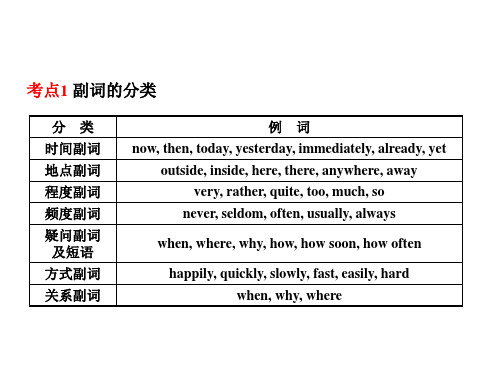
分 类 例 词
时间副词
now, then, today, yesterday, immediately, already, yet
地点副词
程度副词 频度副词 疑问副词 及短语 方式副词 关系副词
outside, inside, here, there, anywhere, away
careful with it!
A. very B. quite C. so D. too
D
6. (· 龙东中考)My cousin is __ heavy C because he often
eats ___fast food.
A. much too; too many C. much too; too much 7. (· 襄阳中考)—Can you catch what the speaker is saying, Tina? B. too much; too much
—It starts ___ at eight o'clock every evening. A A. exactly B. recently C. widely
5. (· 荆州中考)—The boys are talking about the football match ___. —Yes. They B have so many fun things to share.
A. How often
C. How long
B. How soon
14. (· 福建中考)—___ has B Hong Kong been back to our motherland? —For 20 years. How time flies!
2023中考英语重难点专练 专题05 形容词和副词(原卷版)
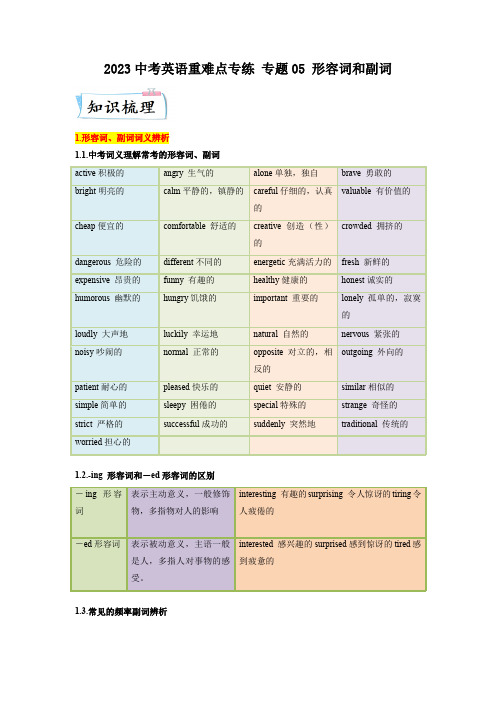
2023中考英语重难点专练专题05 形容词和副词1.形容词、副词词义辨析1.1.中考词义理解常考的形容词、副词1.2.-ing 形容词和-ed形容词的区别1.3.常见的频率副词辨析1.4.enough的用法enough 修饰形容词、副词时,要放在形容词、副词的后面;修饰名词时,放名词前后均可。
例I am old enough to look after myself.我足够大了,能照顾好我自己。
2.形容词、副词的比较等级2.1.形容词、副词比较等级的构成(1)规则变化:good/well→better→bestmuch/many→more→mostfar→farther/further→farthest/furthestlittle→less→least2.2.原级意义的表示3.形容词、副词比较等级的修饰语和复合形容词3.1.形容词、副词比较等级的修饰语形容词是描述人或事物的特征、性质、属性及状态的一种词类,主要用来修饰名词或代词。
对于形容词的考查多集中在三个方面:1. 形容词的比较等级;2. 形容词词义辨析;3. 形容词短语搭配。
纵观近年各地市中考题,对在语言环境中考查形容词词义的题目有逐步增加的趋势。
在学习过程中,要在识记形容词词义上多下功夫,同时兼顾比较等级的各种变化形式。
副词是历年各省市中考必考知识点。
从考查形式看,一般有单项选择、完形填空、词语运用等。
所占分值通常为2~4分。
从命题意图看,侧重考查考生的具体语言环境中使用副词的能力。
中考考查重点:一、形容词词义辨析;二、形容词短语搭配; 三、副词的基本用法;四、副词的分类;五、易混淆的副词用法辨析等。
1.(2022·浙江杭州·模拟预测)That blue bike is ¥3000. This green one is only ¥200. It’s much c________. 【答案】(c)heaper【详解】句意:那辆蓝色的自行车是3000元。
浙江省中考英语总复习第二篇语法突破篇语法专题(六)形容词和副词课件(新版)外研版

③enough作形容词修饰名词时,放在被修饰的名 词的前后均可。 We have enough money/money enough to buy every book here. 我们有足够的钱可以买这里的每一本书。 ④“基数词-可数名词单数-形容词”为复合形容 词,放在被修饰的名词的前面。 Tom is an eight-year-old boy. 汤姆是一个八岁的男孩。
பைடு நூலகம்
(2)形容词作表语时,与连系动词构成系表结构。 The meal is delicious. 这顿饭很美味。 (3)形容词作宾语补足语时,用来说明宾语的性质、状态或特征。 I found the book interesting. 我发现这本书很有趣。 2.多个形容词修饰同一个名词的顺序 限定词(冠词、指示代词、形容词性物主代词、数词)→描绘性形容词 (大小、长短、形状、长幼、新旧、颜色、国籍、材料)→名词。 a famous American medical college 一所著名的美国医学院
考点二 副词
1.副词的一般用法 (1)用作状语。 He speaks English very well . 他英语说得非常好。 (2)用作表语。主要限于少数地点或方位副词、 时间副词以及其他副词。 I'll be back in five minutes. 我五分钟后回来。 (3)用作定语。通常情况下,副词用作定语时,总 是放在被修饰的名词或代词之后。 The people there are very friendly. 那儿的人很友好。
②“not+as/so+形容词/副词原级+as” 表示 “不如……那样……”。 This classroom is not as/so big as that one. 这间教室不如那间大。 He doesn't walk as slowly as you. 他走得不如你走得慢。
中考英语副词精讲(完整经典版)课件
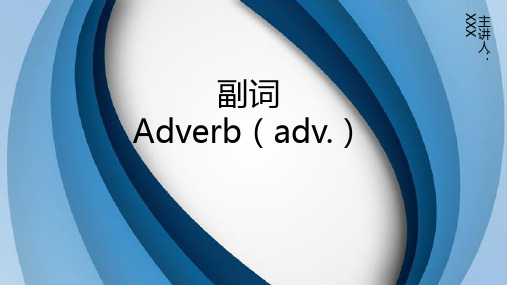
副词的位置
3. 程度副词修饰动词时,与频度副词类似(实义动词之前,助动词、be动词或情态动词 之后);
修饰形容词或副词时,放在被修饰词的前面。
I don’t quite hate him. 我不是很恨他。 I rather like your new bike. 我非常喜欢你的新自行车。 She speaks English quite fluently. 她英语说得相当流利。
副词的种类
时间副词 地点副词 方式副词 程度副词
soon、already、now、yesterday、before、 finally、recently…
here、there、home、abroad、around、near、 down、out…
slowly、hard、carefully、fast、quietly、 angrily…
much、rather、too、quite、very、almost、 pretty…
频度副词 疑问副词
副词的种类
always、usually、sometimes、often、seldom、 hardly、never…
how、where、when、why…
连接副词
how、when、where、why、however、
lovely 可爱的 ugly 丑陋的
注意:中考常考系动词后面跟形容词作表语。
副词的原级比较
原级比较句型:as + adv.原级 + as… 像……一样……
翻译下列句子。 1. 这条狗狗和那条狗跑得一样快。
This dog runs as fast as that one. 2. 她的英文写得和她哥哥一样好。
1. 本身即是形容词也是副词
2024杭州中考英语二轮复习 专题二 第2讲 形容词和副词(课件)

couldn't find him.
A. freely
B. certainly
C. quickly
D. secretly
18. —How do you plan your time, David?
—I usually make a todo list in the morning, and then I can ____B____
3. We were ____A____ about the good news that Chen Yufei won the
women's badminton singles final at the Tokyo Olympics.
A. excited
B. sorry
C. sad
D. nervous
C. sadly
D. early
13. Tina ____B____ watches soap operas because she thinks they are
boring.
A. often
B. seldom
C. usually
D. sometimes
14. After Jerry's father found him breaking the window, he punished
D. thinnest
命题点2 副词词义辨析
(5年7考,完形填空)
满分突破
1. 常见以ly结尾的副词(5年3考)
副词
含义
副词
proudly
自豪地
quickly
含义 快速地
副词 luckily politely happily quietly
(浙江专版)2020中考英语复习方案第二篇语法专题突破专题(四)形容词和副词课件

构成 形容词后直接加-ly
例词 careful—carefully, beautiful—beautifully
以“辅音字母+y”结 尾的形容词,变y为i,再加- lucky—luckily, happy—happily
ly
以“辅音字母+le”结 terrible—terribly, 尾的形容词,去e,再加-y simple—simply
students.汤姆是他班上/所有学生当中最高的。 词最高级+单数名词+in/of短语”
I jump (the) farthest in my class. 我是我 表示“……是……中最……的”
班上跳得最远的。
②“主语+be+one of the+形
容词最高级+复数名词+in/of短 Beijing is one of the largest cities in
前,情态动词、助动词和be动词 上学日我通常起得很早。
之后
主要限于少数状态或位置副词、 作表
时间副词以及其他副词,如in, When will you be back? 你什么时候回来? 语
out, on, back, down, up等
作定 一般放在被修饰的名词或代词之 Life here is full of joy. 这里的生活充满了欢
[注意] 形容词最高级前要加the,副词最高级前的the可以省略。
再加-er, -est
happy
happier
happiest
多音节词及部分双
在原级前加
difficult more difficult most difficult
音节词
中考英语语法精讲:副词

中考英语语法精讲:副词副词是一般只能位于谓词性成分之前,充当修饰限制成分而不受其他成分修饰限制的词类。
论文在意义的基础上,以副词的语法功能为标准,将《国语》副词划分为否定副词、范围副词、程度副词、时间副词、语气副词、情状方式副词和关联副词七个大类。
同时,每个副词大类内部又根据句法语义特点进行次分类。
一、副词的定义表示行为特征或性状特征的词叫副词(Adverb)。
副词常用来修饰动词、形容词、其它副词或全句,用来说明时间、地点、程度、方式等概念。
例如:The girl works hard.(hard修饰动词work)It is very cold today.(very修饰形容词cold)Mostly Ihave lunch at school.(mostly修饰全句)Look! It's snowing very heavily.(very修饰副词heavily)二、副词的种类常见的副词分类如下:时间副词today,now,soon,recently,ago,before,since,finally地点副词here,there,up,down,about,inside,outside程度副词very,much,enough,almost,little,still,quite,so,nearly频度副词usually,sometimes,never,ever,always,often,once,seldom方式副词well,fast,slowly,carefully,badLy,hard,quickly,happily疑问副词how,when,where,why否定副词no,not,hardly,neither,nor关系副词when,where,why连接副词yet,so,however,then,how,when,where,whether,why三、副词的用法1.在句子中作状语Tom,quickly picked up his bag and then went to school.汤姆赶快捡起书包,然后上学去了。
中考英语复习讲义 第6章 副词的用法

The more you talk to the children,the less they will listen.你对孩子们谈得越多,他们听进去的就越少。
【知识拓展】
1.如果用于两者之间的比较,“no+比较级+than...”意为“都不”,是对两者的共同否定,且侧重前者,而“not+比较级+than”意为“不及”,表示前者不及后者,隐含对两者的肯定,但侧重后者。
方式副词
描述动作发生的方式
slowly缓慢地;quickly迅速地;carefully细心地
程度副词
描述行为、动作或状态的程度
too太;really的确;quite相当;little很少地
频度副词
表示一定时间内动作发生的次数
always总是;often经常;sometimes有时
疑问副词(词组)
用来构成特殊疑问句
知识点5副词的比较等级
1.副词比较级和最高级的不规则变化
原级
比较级
最高级
well
better
best
badly
worst
much
most
little
least
far
farther
farthest
further
furthest
【温馨提示】副词的比较和最高级的规则变化和形容词相同
2.副词比较等级的用法
分类
内容导视
知识点1副词的分类
知识点2副词的构成
知识点3副词的句法功能
知识点4副词的位置及顺序
知识点5副词的比较等级
中考英语形容词和副词考点归纳与例析资料讲解

中考英语形容词和副词考点归纳与例析资料讲解中考英语形容词和副词考点归纳与例析中考英语形容词和副词考点归纳与解析【重点讲解】形容词用来修饰名词,说明事物或人的性质或特征。
大多数形容词有比较等级的变化,可分为原级、比较级和最高级三种基本形式,用来表示事物的等级差别。
副词在句子中主要修饰动词、形容词、副词或整个句子。
副词按词汇意义可分为方式副词、程度副词、地点副词、时间副词和频度副词等。
分别用于表示状态、程度、场所、时间。
副词也有比较等级的变化,其规则形式与形容词的相同。
掌握形容词和副词的基本用法要注意以下几点:1、有些形容词加-ly可构成副词。
但由名词加-ly结尾的是形容词,如friendly,lovely, likely,lively等。
2、形容词、副词的比较级等级的变化。
1)规则变化:①单音节词和少数双音节词一般在词尾加-er/ estsmall——smaller——smallest; clever——cleverer——cleverest②辅音字母+y结尾的,把y变成i加-er / est:easy——easier——easiest; heavy——heavier——heaviest③词尾以一个辅音字母结尾的重读闭音节单词,双写该辅音字母,然后加-er/ est:big——bigger——biggest; hot——hotter——hottest④多音节词和部分双音节词,在词前加上more/ most:slowly——more slowly——most slowly;interesting——more interesting——most interesting2)不规则变化:3、表示比较的几种句型:句型1:“比较级+ than ”,例如:You are taller than I.They lights in your room are brighter than those in mine.句型2:“as + 原级+ as”,否定句中可用so… as例如:Tom is as tall as his father.He cannot run so/as fast as you.句型3:“最高级+ in/of…”,例如:The Changjiang River is one of the longest rivers in the world.Peter is the tallest player of the three.4、可修饰比较级的词有much, even, far, still, rather, by far, a bit, a little, a lot,a great deal等。
英语中考语法专题清单五副词讲义
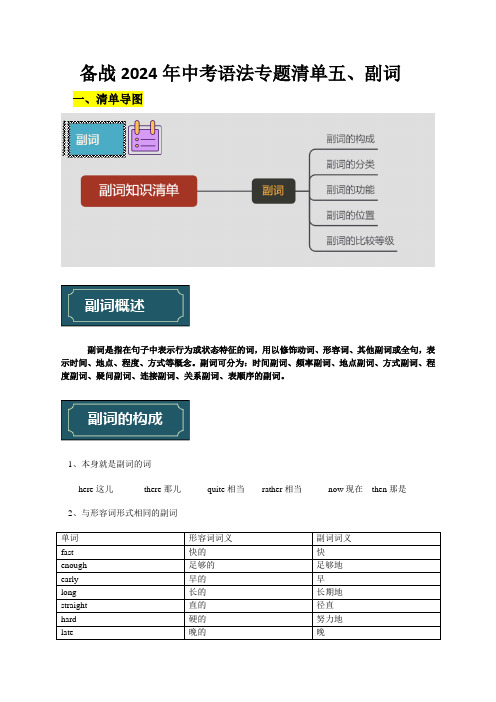
备战2024年中考语法专题清单五、副词一、清单导图副词副词是指在句子中表示行为或状态特征的词,用以修饰动词、形容词、其他副词或全句,表示时间、地点、程度、方式等概念。
副词可分为:时间副词、频率副词、地点副词、方式副词、程度副词、疑问副词、连接副词、关系副词、表顺序的副词。
1、本身就是副词的词here这儿there那儿quite相当rather相当now现在then那是2、与形容词形式相同的副词单词形容词词义副词词义fast 快的快enough 足够的足够地early 早的早long 长的长期地straight 直的径直hard 硬的努力地late 晚的晚(1)、由形容词+ly构成注:shy的副词形式是shyly.She was nearly as tall as he was. 她几乎和他一样高。
温馨提示有些以-ly结尾的词是形容词而非副词。
如:motherly,lovely,lively,friendly,lonely.We've had a lovely time.我们玩得很愉快。
(2)有些副词是由介词或地点名词加后缀-ward(s)构成的,意为“向······”。
如:backw ard(s),downward(s),forward(s),northward(s),onward(s)等。
副词的分类1.时间副词常见的表示时间的副词有now、today、tomorrow、yesterday、before、soon、ago、late、early、still等。
Ask them to e to the meeting tomorrow.请他们明天来参加会议。
2.地点副词常见的表示地点的副词有here、there、inside、outside、home、upstairs、downstai rs、anywhere、everywhere、nowhere、somewhere、down、up、off、on、in、out等。
2020中考初中语法之副词详细讲解
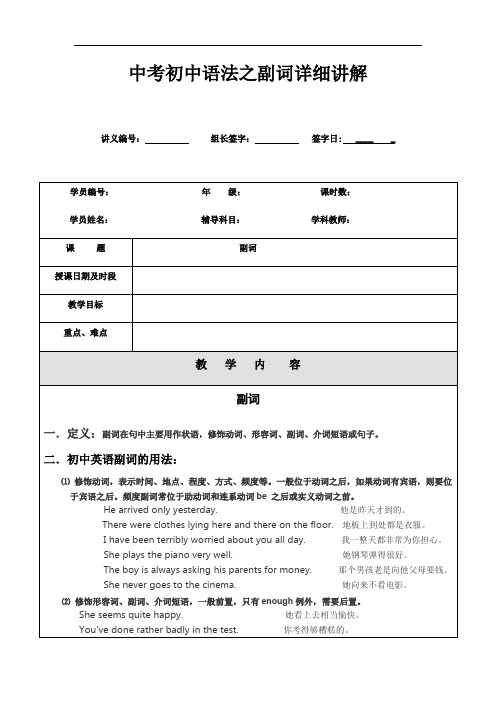
中考初中语法之副词详细讲解讲义编号:组长签字:签字日: ____ _一、英语阅读理解专项练习试卷1.阅读理解Good NeighboursMr. and Mrs. March lived together with their four daughters. Amy was very shy. Beth loved being at home. Meg looked very pretty. Jo was tall and thin and she was a tomboy. Their home was always busy and full of noise and people. Next to them lived old Mr. Laurence and his grandson, Laurie. They lived in a very large and comfortable house. But it was a house without life.One day, Joe saw Laurie standing at an upstairs window in his house and looking down at their garden. Jo's sisters were playing in the snow there. They were throwing snowballs and having a lot of fun. But Laurie's face was very sad."Poor boy!" Jo thought. "He's all alone. He needs some friends." She couldn't stop thinking about him. She wanted to go and see him, but how could she go to the house without an invitation?Then one snowy afternoon, she saw Laurie's grandpa go out. This gave her an idea. She took a broom from the kitchen."What are you going to do, Jo?" asked her sister Meg."To clear the garden path." Answered Jo.When Laurie saw Jo from the window, a big smile changed his pale, sad face.Jo laughed and shouted, "How are you? Are you ill?"Laurie opened the window and said," I'm better now, thank you. I had a bad cold and had to stay inside for a week"."I'm sorry," said Jo. "Are you bored?""Yes, very." he replied."Don't your friends come to visit you?""No. But I don't want to see anybody. Boys are noisy and they give me a headache.""Girls are quiet.""I don't know any girls.""You know us.""That's true! Can you come and visit me?" cried Laurie."I'm not quiet, but I'd like to come," replied Jo. "I must ask Mother first." She ran back into her house.A few minutes later, she returned and rang the bell on the door of Laurie's house. A servant took her upstairs."Here I am!" she said brightly. "Mother sends her love and my sisters gave me this blancmange (牛奶冻) for you.""That looks delicious," Laurie said. He was very happy to see Jo.Jo looked around. There were lots of books on the shelves."A nice room!" she said. "I can read to you if you like.""No, let's talk," replied Laurie."All right," said Jo, "I can talk for hours. My sisters say I never know when to stop.""You have three sisters—Amy, Beth and Meg." Laurie continued."How do you know this?" Jo was surprised."You call each other's names when you are in the garden. Sometimes I can see you all around the table with your mother. She has a very kind face. I like looking at her. I haven't got a mother."Jo felt sad when she heard this."Why don't you come and visit us?" she said, "It isn't good for you to stay in this house all the time.""Thank you. I'd like to come very much." Said Laurie."We know all our neighbours except you." Jo said, "I'm glad we're friends now."She told him about all the interesting things in her life. She said," Besides(除了……之外) plays, I also love books." Laurie loved books too, and offered to show her the library in the house. The library was a wonderful room. Jo loved it."Wow!" she said, "All those books!"Laurie said, "A person needs more than books."(Adapted from Little Women)(1)From the first paragraph, we know ________________.A. Jo's family had five membersB. Jo and Laurie were neighboursC. Laurie and his grandpa were busyD. the four sisters had the same hobby(2)Jo wanted to visit Laurie because _________________.A. she wanted to visit his large houseB. Laurie invited her to play with snowballsC. she felt he was lonely and needed friendsD. Laurie was seriously ill and needed her care(3)What might be the correct order of what happened in the story?a. Jo saw Laurie standing at an upstairs window in his house.b. Jo and Laurie were having a talk happily at Laurie's home.c. Jo wanted to Laurie's home after telling her mother.d. Jo couldn't stop thinking about Laurie.A. a—b—c—dB. b—a—c—dC. b—d—a—cD. a—d—c—b(4)Which words can best describe Jo and her sisters?A. Kind and friendlyB. Generous but rudeC. Quiet and smartD. Funny but carless (5)What does Laurie mean by saying "A person needs more than books."?A. People need to stay in their own houses.B. People should learn much more from the books.C. People need love and friendship besides books.D. People should relax themselves besides reading【答案】(1)B(2)C(3)D(4)A(5)C【解析】【分析】文章大意:文章讲述了Jo和她的邻居Laurie的故事,Laurie跟着爷爷生活没有了母亲,又生病了,心情很不越快,一天当Jo看到了他之后心里放不下,就找机会接近了他,了解了情况,然后成为了好朋友。
【聚焦中考】2017中考英语(浙江地区,外研版)复习(课件)第30讲形容词和副词

浙江专用
第30讲 形容词和副词
形容词和副词在英语语法中属于实词类 ,所占比重较大。中考关于 形容词和副词的考点有: 1.形容词和副词的原级、比较级和最高级的构成规则,基本句型及 其用法; 2.形容词作表语和定语的用法; 3.副词作状语的用法。
高频考向一 形容词
形容词是用来修饰名词或代词 ,表示人或事物的性质、状态和特征的词 。形容词在句中可用作表语,定语和宾语补足语等。
(2)比较级的用法
①可以修饰比较级的词:much,a lot,far,a little,a bit,even,still。
②...than...……比…… 如: Tom is taller than Kate.汤姆比凯特高。 ③选择疑问句中,二选一时 如: Which is bigger,the earth or the moon?哪一个更大,地球还是月球? ④用比较级表示最高级的意思 如: The Yangtze River is longer than any other river in China.在中国,长江比 其他任何一条河都长。 ⑤“比较级+and+比较级”表示“越来越……” 如: He is getting taller and taller.他长得越来越高了。 The flowers are more and more beautiful.花儿越来越漂亮了。
②as...as...和……一样(中间用原级) not as (so)...as和……不一样(中间用原级) 如: Tom is as old as Kate.汤姆和凯特年龄一样大。 Tom is twice as old as Kate.汤姆的年龄是凯特的两倍。 This room is not so/as big as that one.这个房间不如那个大。
初中英语 浙江省外研版中考专题复习讲义 第8课 副词

第8课副词课堂突破中考考点1.副词的原级、比较级和最高级的构成规则、基本句型及用法。
2.副词作状语的用法。
I 用所给词的适当形式填空。
1. The leaders believed (strong)that the purpose of the program was to give young oversea Chinesea chance to learn more about themselves.2. Could you please speak a little more (slow)? I can’t follow you.3. Wei Fang is very young, but she draws as (good)as her brother.4. —Do you think yesterday’s math problem was difficult?—Yes, I could (hard)work it out.5.Jane listens (careful)in her class.6. Now, we went (happy)to coach Simpson and asked how I could start our new football team.7. China has (final)decided to allow the Walt Disney Company to build a theme park in Shanghai.8. Which do you like (well), tea, water or orange juice?9. The old should be spoken to (polite).10. Jack doesn’t study as (hard)as Nick.II根据汉语提示完成句子。
1. Students can get money (简单地)for the number of books they read in a given amount of time.2. Old people in the village say that if the boys think of their crocodile parents, they will be stronger and(勇敢的)because the ceremony will cause great pain.3. We felt (骄傲的)when Liu Xiang won the first prize again in the race.4. Everybody should remember it is not (安全的)to swim in the river alone.5. His grandparents live (独自)in a small house, but they don’t feel (孤单的).6. —I think winter is a beautiful season, (尤其)when it snows.—Me, too.7. In the piano contest, my brother didn’t play well and I did even (差劲的).8. —Have you ever seen the movie called The Secret?—Yes, but I think it’s (无聊的). I fell asleep when I saw it.9. The bread smells good and it sells (好).10. It’s (浪费的)to throw away old things. Some of them can be reused.III根据短文内容和所给汉语提示,在空白处写出单词的正确形式。
- 1、下载文档前请自行甄别文档内容的完整性,平台不提供额外的编辑、内容补充、找答案等附加服务。
- 2、"仅部分预览"的文档,不可在线预览部分如存在完整性等问题,可反馈申请退款(可完整预览的文档不适用该条件!)。
- 3、如文档侵犯您的权益,请联系客服反馈,我们会尽快为您处理(人工客服工作时间:9:00-18:30)。
中考专题复习之副词(学生版)副词一、定义副词主要用来修饰动词,形容词,副词或其他结构。
二、副词的位置1)在之前。
2)在动词和动词之后。
注意:a. 大多数方式副词位于句尾,但宾语过长,副词可以提前,以使句子平衡。
We could see very clearly a strange light ahead of us.我们清楚地看到前面有奇怪的光。
b. 方式副词well,hard等只放在。
例如:他英语说得好。
注意1:副词very 可以修饰形容词,但不能修饰。
I very like English.注意2:副词enough要放在形容词的,形容词enough放在名词。
I don't know him . 他我不熟悉。
There is for everyone to eat.有足够的食物供每个人吃。
三、兼有两种形式的副词1)close与closelyclose意思是;closely 意思是。
Watch him .He is sitting to me.2)late 与latelylate意思是;lately 意思是。
You have come too .What have you been doing ?3)deep与deeplydeep意思是,表示;deeply意思是,表示。
Even father was moved by the film.He pushed the stick into the mud.4)high与highlyhigh表示;highly 。
The plane was flying .I think of your opinion.5)wide与widelywide表示;widely表示。
He opened the door .English is used in the world.6)free与freelyfree的意思是;freely 的意思是。
You can eat free in my restaurant whenever you like.无论什么时候,我这饭铺免费对你开放。
四、形容词变副词的规律a.一般的形容词在结尾加ly变为副词。
例如:careful-carefullyb.以元音加e结尾的单词要去e在加ly。
例如:true-trulyc.辅音加y结尾的单词去y变i在加ly。
例如:angry-angrilyd.单音节y结尾直接加ly。
例如:shy-shylye.以le结尾的单词直接将e变为y。
例如:terrible-terriblyf.形容词、副词同形:五、副词比较等级1)副词的比较级、最高级的变化和形容词的比较级、最高级变化基本相同。
2)副词最高级前一般不加定冠词the。
Which do you like best? 你最喜欢那一个?六、副词与副词的不同1)yet与alreadyalready常用于肯定句子;yet常用于否定句和疑问句句尾。
I have finished my homework. 我已经完成我的作业。
Have you heard from him ? 你已经收到他的信了吗?2)how soon /how often /how long /how farhow long“多久,多长时间”,对一个持续的时间段提问,常用“for+段时间”和“since+点时间”回答。
how soon“多快,多久以后”,对一个短暂性动作提问,用于一般将来时的句子中,常用“in+段时间”回答。
how often “多长时间一次”,对频度提问,常用“once, twice, three times a week ”等回答。
how far“多远”,对距离提问。
①---How have you been in China? --- For three months.②---How will he come back? ---In five minutes.③---How is it from your home to your school? ---About two kilometers.④---How do you visit your grandparents? --- Once a week.3)sometimes/some times/sometime/some timesometimes 有时some times 几次,几倍sometime (过去或者将来的)某时some time 一段时间I come by train, but usually I come by car.The foreign friends will come to our school next week.We have known each other for .We have already met each other this year.I saw him last summer.Our school is larger than yours.4)ago与beforeago表示以现在为起点的“以前”,和表示时间概念的词组搭配使用,常在一般过去时的句子中修饰动词。
before 是指以过去或将来的某一时刻为基准的“以前”,也可泛指以前,常用于现在完成时、过去完成时和一般过去时的句子里。
The meeting began five minutes ago. 会议五分钟前开始了。
I have never been to Suzhou before. 我以前从未去过苏州。
It seems that I have met you somewhere ______.课堂练习1.(10绍兴)---Fred is studying Japanese in one evening school.---Is that true? He has told me about it.A.everB. evenC. alreadyD. never2.(12绍兴). Sally shut the door heavily and started to cry. No one knew ____ shewas so angry.A.whenB. whyC. thatD. how3.(13绍兴)---Do you know Jane visits her grandparents?---Once a week. She loves them deeply.A. how soonB. how oftenC. how longD. how far4.(12杭州)---Do you consider yourself a rude person?--- ______not. I always have good manners.A.ProbablyB. UsuallyC. GenerallyD. Certainly5.(12宁波)---Zhang Lili, “the most beautiful teacher”, has moved us deeply.---Yes, and she is _________ popular with her students.A. sometimesB. neverC. alwaysD. hardly6.(13宁波)Could you please speak a little more ?I can't followyou.A.quietlyB. quicklyC. loudlyD. slowly7.(14宁波)---________ will the dinner be ready? ---Just a minute.A. How muchB. How longC. How soonD. How often8.(14宁波)--- Did you go to the cinema last night?--- Oh, no. I ________ go to the cinema. The tickets, you know, are too expensive.A.alwaysB. hardlyC. usuallyD. often9.(10温州)---It's raining outside.---Yes, it's really wet. I hate it.A.heavilyB. coldlyC. quietlyD. badly10.(12温州)After practiicng for sevral months, I can swim much ________ now.A.slowerB. slowestC. fasterD. fastest11.(09绍兴)She can sleep, read or watch TV (自由地).12.(10绍兴)The city of New York was ( —度)the capital of the UnitedStates.13.(11绍兴)something you have heard about but (几乎不) or never seen inperson.14.(12绍兴)Please eat more (慢慢地)15.(12绍兴)On the screen, one can see a picture, which tells the user how muchfood has (已经) been taken from the plate.16.(13绍兴)These canals are home to many Thai people who (从不) leavethere..17.(14绍兴)The teacher hopes everyone will join________(active)in classdiscussion.18.(10杭州)Have you e________ been to the Great Wall?19.(10绍兴)If a dream comes t________, it actually happens.20.(10杭州)It’s best to water plants either e_______in the morning or late at night.。
